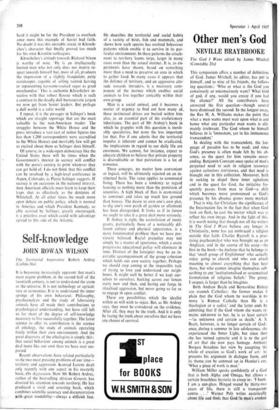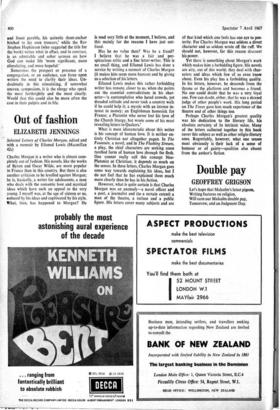Other men's God
NEVILLE BRAYBROOKE
This symposium offers a number of definitions of God. James Mitchell, its editor, has put to himself, and to nine of his friends, the follow.
ing questions : 'Who or what is the God you consciously or unconsciously want? What kind of god, if any, would you create if you had the chance?' All the contributors have answered the first question—though several have dismissed the second. In the longest essay,
the Rev H. A. Williams makes the point that what a man wants must wait upon what is and
hence what any particular man wants is ulti- mately irrelevant. The God whom he himself believes in is 'immanent, yet in his immanence transcendent.'
In dealing with the transcendent, the lan- guage of paradox has to be used; and since God's presence is often made felt by his ab- sence, so the quest for him remains never- ending. Benjamin Constant once spoke of man's perpetual need to seek in religion resources against agitations interleaves, and that need is brought out in this collection. Moreover, both in seeking to dispel these inner agitations and in the quest for God, the initiative fre- quently passes from man to God—a shift which becomes more pronounced as God's presence by his absence grows more marked.
That is why for Christians the significance of the Incarnation lies in the fact that when God took on flesh, he cast the mirror which was to reflect his own image. And in the light of this, it is worth noting that though not all the writers in The God I Want believe any longer in Christianity, none has yet embraced a religion outside that faith. Charles Rycroft is a prac- tising psychoanalyst who was brought up as an Anglican, and in the course of his essay—the first in the book—he declares that he belongs to that 'small group of Englishmen' who actually enjoy going to church and who can attach meaning to almost everything that they hear there, but who cannot imagine themselves sub- scribing to any 'institutionalised or systematised formulation of religious beliefs.' The group, I suspect, is larger than he imagines.
Both Andrew Boyle and Bernardine Bishop are staunch Catholics: the former makes it plain that the God whom he worships is no more 'a Roman Catholic than He is a theologian or a sadist,' and the latter ends by admitting that if the God whom she wants re- mains unknown to her, he is as least certain —`as unknown and certain as death.' A. S. Byatt, however, is no longer certain of God : once, during a summer in late adolescence, she experienced the Inner Light, but since then she has turned agnostic and it is to the god of art that she now pays homage. Anthony Burgess broadens her view by accepting the whole of creation as God's work of art: he presents his argument in dialogue form, and its theme can be summed up in Hamlet's cry, 'What a piece of work is man.'
William Miller speaks confidently of a God that is both Alpha and Omega, but allows a certain breathless hysteria to creep in: 'I burn: I am a sun-glass. Hinged round by thirty-two years of life, there is still a transparent centre. . . Werner Pelz writes ecstatically about Me and finds that God 'is man's crudest
and finest parable, his quixotic sheet-anchor hitched to his own trousers,' while the Rev Stephen Hopkinson (who suggested the title for the book) writes what in effect, and in contrast, is an admirable and sober sermon on how God can make life 'more significant, more stimulating, and more hopeful.'
Sometimes the prospect or presence of a congregation, or an audience, can force upon writers the need to clarify their ideas. Un- doubtedly in this stimulating, if somewhat uneven, symposium, it is the clergy who speak the most forthrightly and the most clearly. Would that this could also be more often the case in their pulpits and in life.































 Previous page
Previous page